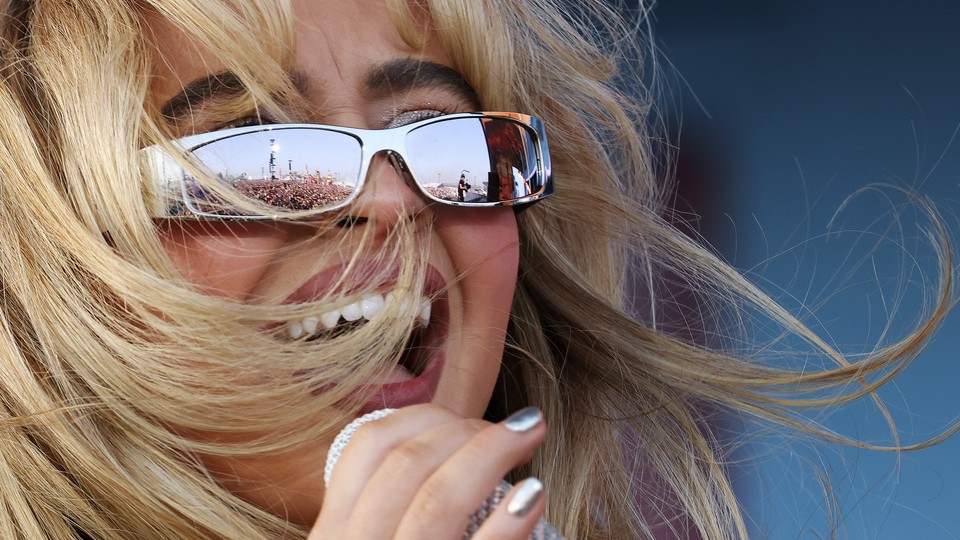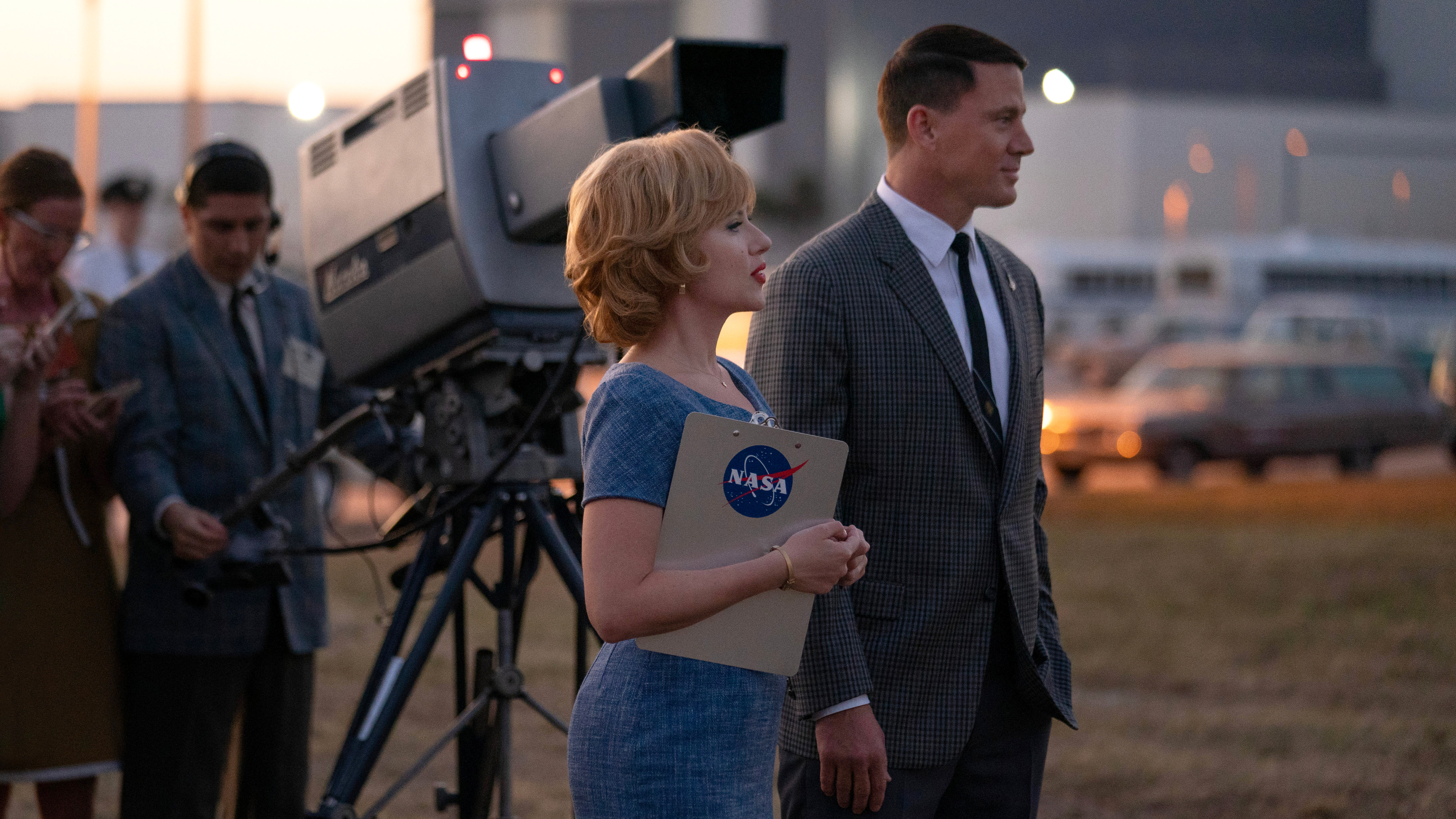The “Song of the Summer” Is a Myth
6 min read
This is an edition of The Atlantic Daily, a newsletter that guides you through the biggest stories of the day, helps you discover new ideas, and recommends the best in culture. Sign up for it here.
Summer is in full swing, and everywhere I go, I hear Sabrina Carpenter’s catchy, somewhat nonsensical “Espresso.” But does that mean it’s the song of the summer? There’s also Charli XCX’s new album, Brat, whose high-concept club tracks have led fans to embrace “brat summer”; meanwhile, Kendrick Lamar’s “Not Like Us” and Shaboozey’s “A Bar Song (Tipsy)” have been dominating the charts. To understand what makes tracks eligible for “song of the summer” status—and why people love to anoint them—I spoke with my colleague Spencer Kornhaber, The Atlantic’s music critic.
First, here are three new stories from The Atlantic:
- David Frum: Biden’s heartbreaking press conference
- Trump isn’t even pretending anymore.
- AI has become a technology of faith.
“A Shared Hallucination”
Lora Kelley: How does a song become a “song of the summer”?
Spencer Kornhaber: “Song of the summer” is a much-contested term, more of a cultural myth or a shared hallucination than a hard-and-fast label. Most summers give us a few songs of the summer, serving different constituencies.
That said, a song of the summer doesn’t just mean “big during the summertime,” in my opinion. It has to have an upbeat, bouncing quality. It has to be something that works equally well in a car with the windows rolled down and at a lively barbecue. I’d say Sabrina Carpenter’s “Espresso,” Shaboozey’s “A Bar Song (Tipsy),” and Kendrick Lamar’s “Not Like Us” all fit the bill—though you probably don’t want to play Lamar’s song at a barbecue filled with Drake fans.
Summer is a season when we’re spending time in social spaces; songs aren’t just a headphones concern. When people want to remember what a summer was like, they might do it with music. That’s in part where the impulse to even talk about a song of the summer comes from.
Lora: We famously live in a time with no monoculture, yet it feels like “Espresso” is everywhere. How does a song become ubiquitous right now?
Spencer: Like a lot of cultural phenomena these days, it has to do with Taylor Swift. Sabrina Carpenter is a former Disney Channel actor who’s been putting out music for more than a decade. But she broke out in a new way when she started playing opening sets for Swift on the Eras tour. Given that Swift is close to being the only monocultural phenomenon we have, she gave Carpenter the most valuable kind of platform imaginable for a young singer in 2024.
The tour didn’t just raise Carpenter’s profile; it probably helped with streaming. If Spotify knows that a portion of Swift fans listen to Carpenter’s music, it’s going to recommend Carpenter to other Swift listeners who don’t already listen to her—and that’s a huge potential audience. Given enough exposure, a song this catchy is inevitably going to snowball in popularity.
What’s more, Carpenter sounds like a logical evolution for what post-Swift pop should be. The music of “Espresso” is pretty generic. But the lyrics have a lot more narrative and personality than the generic pop of, say, Katy Perry 10 years ago. Swift has taught a generation of young women how to write catchy songs that are also interesting, and we’re seeing the payoff now.
Lora: As you have written, pop divas this summer are taking on subjects of womanhood in a fresh and unapologetic way. How much of a departure is this music from past female pop hits?
Spencer: We’ve had lots of pop about being a strong, independent woman before, but to me, the difference is that these new singers are making sport of their disinterest in what straight men think of them. For example, Chappell Roan doesn’t come off like she’s straining to please the broadest possible audience; rather, she’s cracking inside jokes with the girls and the gays. And Billie Eilish’s “Lunch” is about having a crush on another woman.
Pop music as we traditionally think of it (which “Espresso” very much is) is actually not popular right now. It’s not a mass phenomenon in the way that it used to be 10 years ago. Hip-hop is a far bigger, more important, more profitable sector, and has been for a long time now. To me, the really fun thing about this moment in pop is that these girls are in the charts conversation at all.
Lora: Do songs of the summer shape the mood, or vice versa? Is it “brat summer” because Charli XCX told us so, or is she simply picking up on a broader feeling?
Spencer: Cause and effect are impossible to untangle with cultural trends, which is why they’re so fun to analyze. I tend to think that the pop music that succeeds has to be cutting-edge in some way—even if it seems retro or trite, there’s something going on that’s hitting ears as novel and intriguing.
In the case of Charli XCX, she’s given us new words and sounds to suit a pretty classic feeling that comes over people every summer: wanting to stop worrying about your responsibilities and put pleasure first.
Lora: I have to ask: What does the Sabrina Carpenter refrain “That’s that me espresso” mean?
Spencer: She’s hot! Honestly, that nonsensical chorus is interesting: People have compared it to the weird lyrics that Britney Spears used to sing, written by a Swedish songwriter who didn’t care about English grammar. But there’s a crucial difference. At one point in “Espresso,” Sabrina giggles and says, seemingly referring to herself, “Stupid!” That little hint of self-awareness is what makes her this summer’s espresso.
Related:
- The “Espresso” theory of gender relations
- The next great American mega-genre
Today’s News
- President Joe Biden met with House Democratic Leader Hakeem Jeffries last night, who did not offer an endorsement of Biden’s campaign.
- A federal judge dismissed Rudy Giuliani’s bankruptcy case, clearing the way for creditors to pursue his assets.
- Jury deliberation began in the trial of Senator Bob Menendez, who is charged with 16 criminal counts including bribery and acting as a foreign agent.
Dispatches
- The Books Briefing: Everyday plants can teach us a lot about history, Maya Chung writes.
Explore all of our newsletters here.
Evening Read

Maybe She’s Born With It. Maybe It’s Neurocosmetics.
By Hannah Seo
For just $65, the skin-care company Selfmade will sell you a kit that will purportedly help you feel more stable and confident in your relationships—and get better skin all the while. According to the kit’s marketing copy, it comes with a serum that enhances “safety and comfort with self,” a moisturizer that “promotes awareness that past negative experience and emotional states can carry throughout your life,” and the best-selling relationship-psychology book Attached. Together, the “Securely Attached Kit” is a “ritual” that promises to reframe your attitudes to both your skin and self. It’s cheaper and arguably less involved than therapy.
Read the full article.
More From The Atlantic
- The Trump national convention
- Is Kamala Harris ready for Trump?
- Photo: A volcanic ritual in Indonesia
Culture Break

Watch.Fly Me to the Moon (now in theaters) is a surprisingly charming rom-com that speaks to our era of AI anxiety, Shirley Li writes.
Read. “My Twin,” a short story by Edan Lepucki:
“After my divorce was finalized, I quit my job. I quit my book club. My monthly poker game … I left every group text. It’s easier this way.”
Play our daily crossword.
Stephanie Bai contributed to this newsletter.
When you buy a book using a link in this newsletter, we receive a commission. Thank you for supporting The Atlantic.



